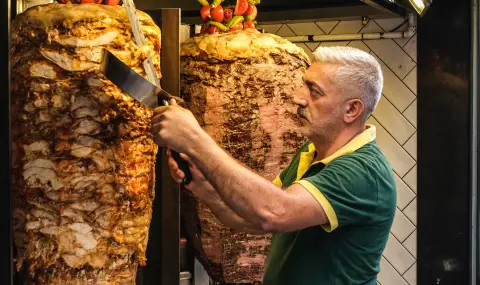The meat is most important: it must be lamb or veal no older than 16 months. No other meat can be used for döner. This is the insistence of the Turkish Dune Federation. She has filed a request in the EU for the döner to be protected as a "traditional specialty", which affects not only the meat, but also the marinating, stringing it on the shisha, as well as the precisely determined baking time, informed the German public television ARD.
There are also precise instructions on how the shisha meat should be cut – from top to bottom, in strips of two to five millimeters, with a special döner knife about 55 centimeters long. Regarding the other ingredients – the bread, the sauce and the salad – there are no restrictions.
The requirements are very detailed
If the submitted request is granted, the döner will enter the same category as Italian mozzarella or serrano ham – they are among the 90 "guaranteed traditional foods" currently protected by the EU. It follows that they can be produced and sold under the relevant name only according to the criteria that have been approved by the EU at the request of the applicant.
Dunner sellers in the EU will have to comply with these criteria in the future. And this will either lead to an increase in the price, or a change of the name will be necessary, states ARD.
Will the döner be called a "rotating skewer" in the future?
It may come to the point that the previous dünerjis in the future will be called "rotating skewers", if the request from Turkey is crowned with success, predicts the German public-law media. "From now on, döner will have to be called something else, there will be a lack of transparency, difficulties in distinguishing and legal uncertainty,", suggest the German Association of Hoteliers and Restaurateurs.
Therefore, they believe that the current initiative from Turkey is only to the detriment of the customers. "Because the submitted request does not explicitly refer to the quality standards, but to what is understood in Germany by a düner."
And in this regard, the quality standards in Germany have been fixed in a regulation since 1992: it stipulates that the proportion of mincemeat in döners should be a maximum of 60 percent. Chicken doners are not mentioned at all, although they are now widespread.
Germany - the center of dune in Europe
The Berlin-based Turkish Düner Producers Association in Europe is also rather skeptical of the new protection rules, but has refrained from making an official statement for now, writes ARD.
According to the data of this company, in Germany the branch has a turnover of 2.4 billion euros per year, and in Europe as a whole – 3.5 billion. Consumer protection expert Anna Cavazzini, representative of the Greens in the European Parliament, believes that there is currently too much resistance in the public debate. "And the fact that many organizations have already expressed their opinion will have an impact."
The German public law media recalls here, however, that there are other food products from countries outside the EU that are protected in Europe as a traditional specialty – for example sea salt from Guinea and Turkish coffee.
Many disputes over origins
The Federal Service for Agriculture and Food has already issued ten "reasoned objections" from Germany against listing the dune as a guaranteed traditional specialty. These objections will be submitted to the European Commission by July 24, writes ARD.
The commission will then start a consultative procedure, which should lead to a decision within a period of six months. This will hardly be easy, believes MEP Marion Valsman: "It is with the dune that there are many disputes regarding its origin. So it's not clear who should get the intellectual property rights." Ultimately, it is the European Commission that must make the final decision, including on the basis of the recommendation of the European Intellectual Property Agency.
Walsman tells ARD that it is "very difficult to imagine the döner getting the protected status of a guaranteed traditional specialty, as is the case, for example, with the Neapolitan pizza". Because although the roots of the duner are in Turkey, it became popular thanks to Turkish migrants in Germany – and in its various variants it has almost become a German national dish.
Catherine Schmidt (ARD)
